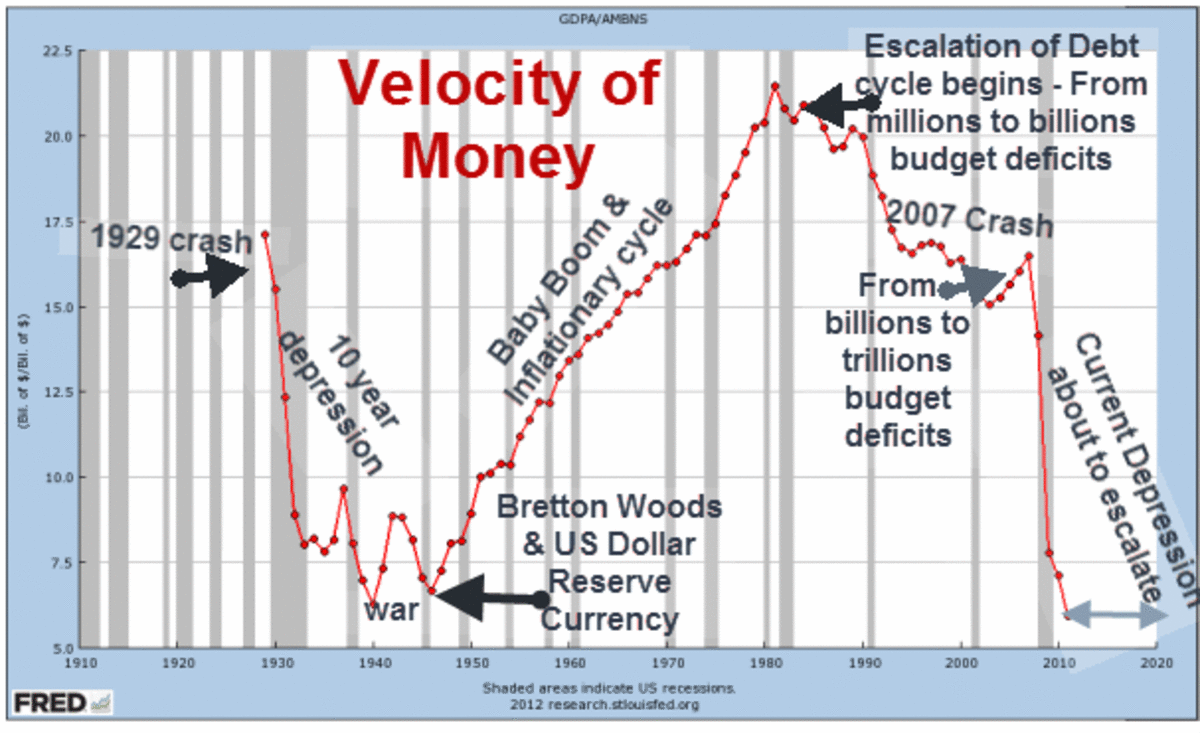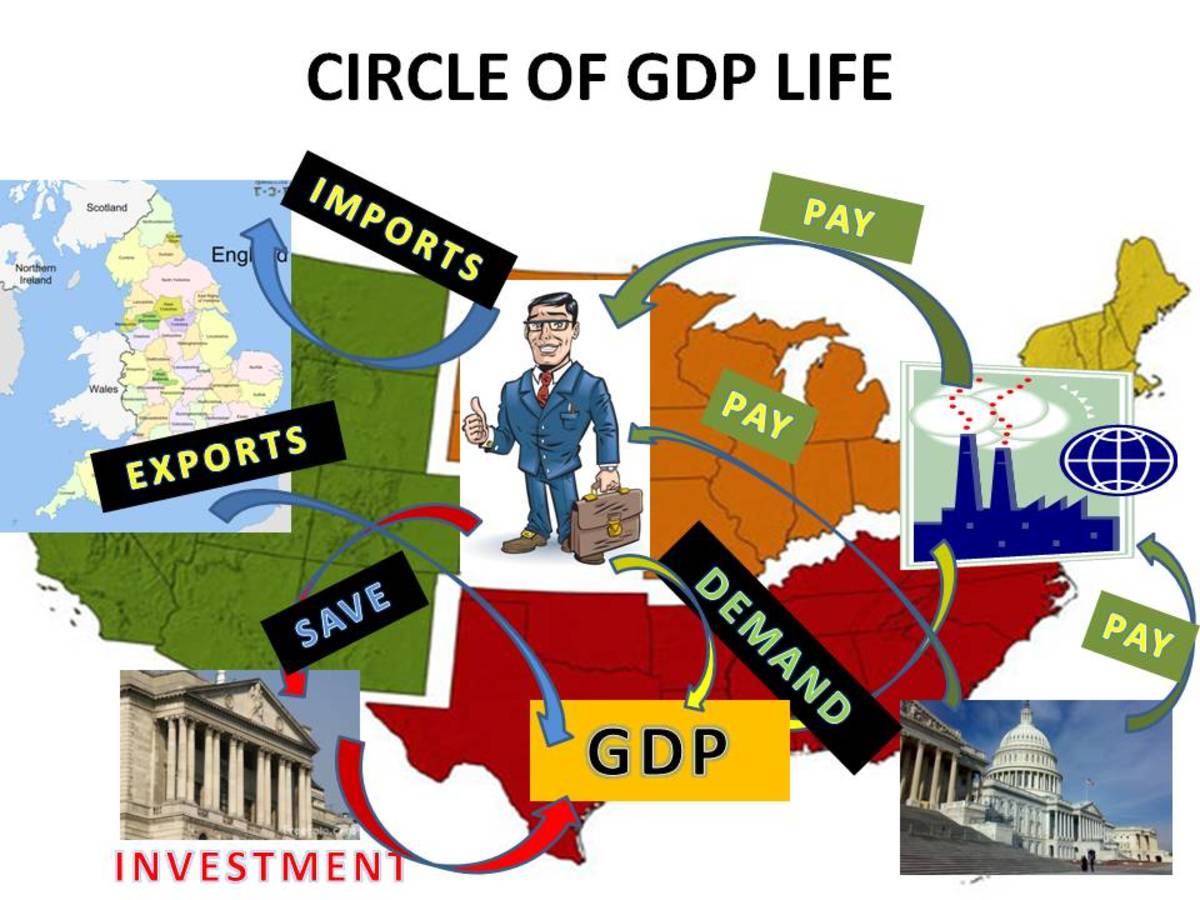Feds Drastically Cut Spending, Consumer Spending Grows - YET, Economic Growth Tanks! Austrian Economics Rules! [191*4]
ECONOMIC GROWTH SINCE 2009

A CASE WHERE CONSUMER SPENDING INCREASES BUT THE ECONOMY CONTRACTS
IT WAS REPORTED AT THE END OF JANUARY, 2013, that economic growth for the fourth quarter, 2012 went negative by declining at an annual rate of -.1%*; the first decline since 2009. When I heard the news that Wednesday morning, I expected the stock market to crash on the report; it barely reacted - the DOW fell all of 44 points for the day. Why such a tepid reaction to such happy news which validates everything those on the Right have been saying for the last four years ... massive government spending is going to going to kill growth?
Well, as is always the case, one must look behind the headlines to find the true story, and such is the case here. As we all know contractions occur when the economy slows down; and the economy slows down because spending decreases - which is what happened in this case as well. But, as Paul Ashworth, chief U.S. economist for Capital Economics said in a research note, "the best-looking contraction in U.S. GDP you'll ever see," [from a CNN article]
That is a strange thing to say, isn't it? Why would he say it? Maybe because consumer spending increased at a robust 2.2% in the fourth quarter, or possibly because housing, both prices and sales, have turned around; how about the fact that the uncertainty about what personal income tax rates are going to be is over. All of those things are pro-growth signs, not negative, yet we had negative growth. So, what happened?
OK, one cause was declining business inventories during the fourth quarters. This would be expected; businesses increased inventories during the third quarter and early October in preparation for Halloween, Thanksgiving, and Christmas. Then they cut spending for the rest of the year in order to work those inventories down; that is always a drag, but generally not enough to pull the whole economy down, especially in the face of increased consumer spending.
* The original chart I displayed depicted the negative growth contained in the preliminary Q4 2012 report in January 2013. The current chart, Chart 1, shows the final Q4 2012 change in GDP that was released a several months after the report I am discussing in this Hub.
I'll have more to say about what has transpired since this Hub was written in a new section.
SO WHERE IS THE CULPRIT?
IF YOU LISTEN TO A CERTAIN SEGMENT of the loyal opposition, it can't be government spending, "for spending is the problem", according to Speaker Boehner, et. al. As a consequence, the Right's panacea to all our economic ills is to drastically cut federal spending. And, if you listen to another segment, government spending shouldn't matter because it doesn't produce (or eliminate) jobs anyway and therefore has no impact on economic growth in any case. What the government does do which hurts growth, according to these sages, is print too much money and take on too much debt thereby making it worth less (high inflation) and unavailable for investment. These are fundamental Austrian economic viewpoints, if you allow me to be somewhat loose with my terminology. The Right's logic appears to be as follows: despite the last argument, if government spending does go up - then it is axiomatic that economic growth must go down, and if government spending goes down - economic growth goes up, don't you see.
But, Keynesian's, take heart, in a back-handed sort of way. The actual reason for this small economic contraction, according to real economists, in an environment of increased consumer spending, and other signs of modest growth, was 1) a decline in business inventories and 2) a major decline in spending in other important segments of the economy, in this case, you guessed it, government spending - a lot of government spending, mainly from defense.
In fact, defense spending alone declined 22% in the fourth quarter, mainly because of the uncertainty of future funding due to the political situation; a situation which, as of Jan 30, 2013, is still on-going. The Defense Department, in fact, all federal departments, had to severely restrict spending because they had no idea if the sequester was going into effect by the end of the year or not.
And, whether those on the Right want to believe it or not, money spent by the government actually does goes into the general economy, just as personal or private business spending does, and is a significant portion of the Gross Domestic Product. This is so because the government purchases goods and services from the public sector and pays wages to those who do the same.
LARGE CUTS IN GOVERNMENT SPENDING CAN BE A PROBLEM
THE SEQUESTER IS THE ELEPHANT IN THE ROOM (and it still is two years later). According to the economic theory from the Right, if sequester happens, this should increase economic growth; if you are on the Left, you would predict a recession. The mathematics of economics suggest those on the Left have a significantly higher probability of being correct than those on the Right.
The reasoning is the same, just on a much larger scale. With the sequester taking hold, demand for goods and services will drop immediately as the federal government halts purchases to meet the new guidelines; it will make the 4th quarter 2012 decline look pale by comparison. Demand will be further decreased by the large layoffs of federal support contractors (increasing unemployment costs at the same time); these people, by and large, get paid higher than average salaries. Lastly, immediate demand decline as the federal government is forced to reduce its workforce, especially so if it actually lays (or RIF) employees off in addition to the normal routes of reduction like attrition and buy-outs. This is a big-time jolt to a fragile economy, much like what happened in 1937-38 when Roosevelt did much the same thing thereby leading to the 1937 recession; they weren't sufficiently recovered from the Depression of 1929 to absorb the shock of reduced federal spending.
As big as this reduction in demand will be, it still may not be enough to produce a real recession; it will certainly produce at least one quarter of negative growth, however. The key is whether companies and corporations begin laying large numbers of employees off because of the sudden decrease in demand. The immediate decrease will be in defense and federal department related goods and services. But those industries buy from the general economy and will subsequently reduce their demand their as well. There will be a tipping point where a positive feedback cycle is created and a recession is inevitable. Where that point is depends on how strong the rest of the economy is, don't you see. What is your estimation of the strength of our economy?
No, Speaker Boehner, "spending isn't the problem", as you so naively put it. The more correct statements are: "unwise spending is part of the problem", "obstructionist politics are part of the problem", "increasing deficits as a percentage of the GDP are part of the problem" and there are a host of others. Speaking of the latter statement, did you know that in 2008, the deficit was 3.19% of GDP, in 2009 - 10.13%, 2010 (when Obama's spending was out of control according to the Right) - 8.92%, 2012 - est 8.51%, 2017 - est 3.01%; yep, spending appears to be the problem.
As an aside, my step-daughter and her husband went down to Orlando, FL to spend his birthday money. He needed a GPS for his boat and visited several sporting goods stores; yes this leads to a statement about the economy. Being a country boy from rural Florida, he is also rather fond of guns, all sorts of them. Consequently, while looking for the GPS, he also pursued the weapons for sale. What did he find? ... Not much! The display cases in three different stores, large stores, which held pistols of one sort or another were virtually empty, and most or all of the ammunition was gone as well! The rifles were thinned out as well.
All this brought about because of hysteria of unthinking people who are translating the unlikely ban on assault rifles, and the more likely ban on large capacity magazines, to a total ban on all guns; an absolutely amazing leap in illogic (yes, I know I just coined a word)
However, for the economy, the timing couldn't have been better! This unbelievable phenomenon is widespread, according to reports, especially in the South. Gun aren't cheap, I am guessing the cheapest are around $100. Can you imagine the huge amount of money being funneled into the economy from this irrational fear? What is even better, it is drastically depleting inventories, first at the retail, then at the wholesale, and finally at the manufacturing levels. This, in turn, will generate increased production just to get back to status quo, let alone meet any increased demand (I think they would be foolish to believe the increase is permanent, however). And that effect will outlast the spike in retail sales. Consequently, the overall impact will be somewhat long-term and significant.
I suspect it is large enough to begin showing up in the economic reports shortly. Time will tell.








